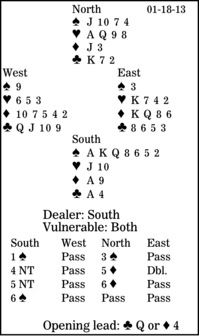Bridge column, January 18: Give partner a helping double

At the bridge table, sometimes a double can increase an opponent's troubles. In this deal, if East does not double North's five-diamond Blackwood reply, West will lead the club queen against six spades. But if East doubles, West will start with the diamond four. What should South do in each case?
When North responded with a three-spade game-invitational limit raise, South launched Blackwood. This was a theoretical error because he had two immediate heart losers. If North had shown no aces, South would not have known what to do. South should have control-bid (cue-bid) four clubs, showing a first-round control there and expressing slam interest. Then, when North control-bid four hearts, South could have jumped straight to six spades.
After a club lead, South wins, draws trumps, and runs the heart jack. The finesse loses, but declarer has 12 tricks.
When West leads a diamond, though, South must be careful. There will be a tendency to assume that the heart finesse is winning, but that line leads to trouble. Declarer should play low from the board and capture East's diamond queen with his ace, draw trumps, and play three rounds of clubs, ruffing the last in his hand. Then South casts adrift with his last diamond.
East wins, but is endplayed. If he shifts to a heart, it is into dummy's ace-queen. Or if he leads a minor-suit card, declarer sluffs a heart and ruffs on the board.
** ** **
COPYRIGHT: 2013, UNITED FEATURE SYNDICATE
DISTRIBUTED BY UNIVERSAL UCLICK FOR UFS

